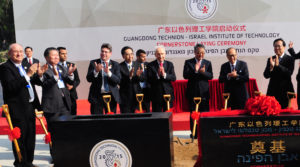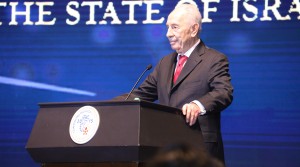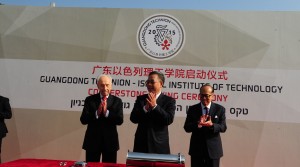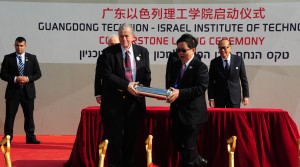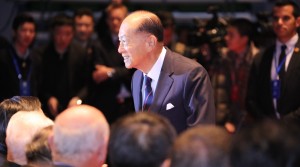(Shantou, China 16 December 2015) – The Technion-Israel Institute of Technology, a global leader in science and technology education, broke ground today to launch the Guangdong Technion Israel Institute of Technology (GTIIT) in Shantou, China located in Guangdong Province. GTIIT, a historic partnership between the Technion and Shantou University, will offer high-level, innovative and research-oriented undergraduate and graduate education.
Leading the groundbreaking ceremony were former Israeli President Shimon Peres, Hong Kong business leader and philanthropist Li Ka-shing, Technion President Peretz Lavie, GTIIT Chancellor Li Jiange, GTIIT Vice Chancellor, Technion Distinguished Professor and Nobel Laureate Aaron Ciechanover, and Ofir Akunis, Israel’s Minister of Science, Technology and Space.
GTIIT will create not just a new academic facility, but a new era of cooperative research between Israel and China in science, engineering and the life sciences. For the Chinese, the GTIIT brings the Technion’s expertise on creating a topnotch technical institute, as well as a stimulating dose of Israeli-style entrepreneurialism on a strategic level.
“In this day and age, no one has an iota of doubt that technological innovation underpins a country’s ability to create collective wealth, and that it is the key impetus to individual success. Creativity is the defining centerpiece of our time — powering us into the future. Establishing a creative paradigm is not easy to set right, only through education and the rule of law can we build a free and fair, fun and fruitful future for all,” said Mr Li Ka-shing.
“Our unprecedented collaboration will be truly transformational for the Technion, Shantou and Chinese education. The combination of the innovative and entrepreneurial spirit of Israel and the unbelievable scale and resources of China will result in a great partnership. Together we will create a major research institute that will help not only China and Israel, but also mankind in general,” said Technion President Peretz Lavie.
At the ceremony, President Peres said, “The establishment of a Technion campus in China is more proof that Israeli innovation is breaking down geographic borders. China is one of Israel’s major partners in technology and hi-tech, and there are over 1,000 Israeli companies active in China. I hope that the economic cooperation between these two countries will continue to expand, as both countries have much to share with, and learn from, one another.”
“This is an unprecedented achievement for the Israeli academia, which in fact, opens up an Israeli university in China,” said Israel’s Minister of Science, Technology and Space Ofir Akunis during the ceremony. “I see a strategic importance in strengthening and deepening our relations with China in all aspects: economically, technologically and scientifically. One of the major goals I set when I took office is strengthening and encouraging cooperation between Israeli and Asian countries that have a great deal of respect towards Israeli innovation, science and high-tech industry.”
“I am very happy for the cooperation materialising between the Technion; Guangdong Province, one of the richest and most important of China’s provinces, and Shantou University. This collaboration will lead to the construction of a Technion campus at Shantou,” said Technion Distinguished Professor Aaron Ciechanover, GTIIT Vice Chancellor. “The Technion will contribute its extensive experience in training engineers who know how to apply what they have learned, and turn their knowledge into commercial products that focus on science and technology. Our Chinese partners will contribute their diligence and devotion, qualities that we Israelis are somewhat lacking. Thus, this collaboration will benefit both sides. I would like to acknowledge special thanks to Mr Li Ka-shing and the philanthropic fund he established, for his remarkable return to his hometown and his outstanding contribution to its advancement.”
“This week, Shantou became Haifa’s forth twin city,” said Yona Yahav, mayor of Haifa. The connection between Shantou and Haifa is unique due to the high involvement of Haifa in the Chinese economy. The ecosystem created by the economic cooperation between higher education and entrepreneurship, as exists in the case of the Technion and Haifa, is a successful model that the Chinese wish to implement in Shantou. The Haifa municipality sees national importance in advancing the cooperation and strengthening of ties between China and Israel.”
“I want to thank the Israeli Government and the colleagues at Technion, facilitating the progress of human civilisation through science and technology has been the common aspiration of China and Israel. GTIIT will continue the fine tradition of Technion in Shantou, Guangdong Province so as to build the ‘Silicon Valley’ in South China,” said Li Jiange, inaugural President of GTIIT.
For the Technion, the GTIIT means increased global reach and stature. The investment in the collaboration will also benefit the research facilities and infrastructure at the Technion’s Haifa campus. It will also form an anchor in the Far East that complements the Technion’s partnership with Cornell University at the Jacobs Technion-Cornell Institute at Cornell Tech, in New York City. Finally, an industrial park planned for the GTIIT campus will serve as a foothold for Israeli companies to crack key markets in the U.S. and China.
GTIIT is fully supported by both Guangdong Provincial Government and Shantou Municipal Government. Those two governments granted the land for the university, and the Li Ka Shing Foundation has been supportive in the preparation and construction of interim campus of the GTIIT. Mr Li Ka-shing and his Li Ka Shing Foundation initiated the partnership between the Technion and Shantou University in 2013.
GTIIT will be comprised of three units: the College of Engineering; the College of Science; and the College of Life Science. Areas of study will eventually include chemical engineering, materials engineering, environmental engineering, mechanical engineering, chemistry, mathematics, physics, biotechnology and food engineering, biology, and biochemical engineering. Majors may be adjusted or replaced, depending on the need of Guangdong and the development of the GTIIT.
The initial class of students is planned for 2016 with an initial enrollment plan of 100 students for chemical engineering. At full build, the GTIIT is expected to enroll some 5,000 students made up of 4,000 undergraduate and 1,000 graduate students.
Speech by Mr. Li Ka-shing
The Honourable President Peres, Governor Zhu, Minister Akunis, President Lavie, Chancellor Li, Vice Chancellor Ciechanover, distinguished guests, ladies and gentlemen,
Good morning, welcome to Shantou!
We just bore witness to a historical moment. I am most certain, everyone who has laboured for five years to make this vision into reality must be as thrilled and exuberant as I am.
When I am weary and feeling worn, when I am gloomy and feeling torn, I think of Shantou University, herein lies my heart—forever sealed and cast in its halls of learning.
This barren land has turned into a field of dreams. Today 30 plus years later, 40,000 graduates from our university are pursuing their dreams and missions, each in their own way and our medical graduates serve 70% of the patients in Chaoshan area.
Driving reforms in education through a dense forest of ideology could be a most harrowing and lonesome venture—toiling through thick and thin. But out of difficulties grew miracles—and this is an awesome one.
Since 2001, Shantou University has successfully pioneered a series of constructive reforms in higher education. Together with Technion Institute, I am so excited at the prospect of even greater transformative changes for the individual and for our country.
In this day and age, no one has an iota of doubt that technological innovation underpins a country’s ability to create collective wealth, and is the key impetus to individual success. Creativity is the defining centrepiece of our time—powering us into the future. Talent, imagination, meta-thinking and qualitative intelligence could neither be moulded, controlled nor channeled. Establishing a creative paradigm is not easy to set right, only through education and the rule of law can we build a free and fair, fun and fruitful future for all.
One of the founders of Technion Albert Einstein said, “There are only two ways to live your life. One is as though nothing is a miracle. The other is as though everything is a miracle.”
These are words that resonate deeply in me. No one can afford to sit and wait for miracles—miracles don’t just happen! You make them happen. I am 87 years old, my unchanging promise is that I will never stop pushing forward for a more hopeful future.
We witness today the miracle of tomorrow in GTIIT. To all levels of the Chinese government who supported our quest and walked a thousand miles with unyielding determination, words alone cannot express my deepest gratitude to you all—especially Governor Zhu. And to all my friends in Technion, thank you for pioneering the future of humanity. To the State of Israel, thank you for sharing your greatest treasure with us.
GTIIT will be the home for the wise and innovators. With the profound impact it will bring to mankind and my beloved homeland, I envision a wonderful world for everyone—for generations to thrive with dignity, freedom and happiness. Thank you!
Speech by Mr. Li Jiange
Good morning!Even though I have served society in different capacities for over 46 years, I am filled with excitement and emotions at this inauguration ceremony as I assume the position of inaugural President of GTIIT today. It is a great honor and privilege for me, but it also carries great responsibility, so please allow me to express my deep gratitude to China’s Ministry of Education, Guangdong Province, Shantou City, Mr Li Ka-shing, GTIIT Board of Directors and colleagues for your support, trust and love.
After a long service in government, academia and financial industry, why did I gladly accept this heavy burden? The reason is that I have always held sacred that education is the legacy of the soul of a nation. This is a mission of immense gravity, but I am confident that, together with my dear colleagues, we can foster Technion’s mission of “Education for Nation Building”, advocating for independent and free thinking in a campus culture that dares to question status quo; transplanting the Israeli innovative gene for encouraging discovery and acceptance of failure to cultivate international cutting-edge talents in science and engineering for Guangdong Province. The timing is also fortuitous as the Chinese Government has mandated policies in support of innovation and technological development providing a truly conducive environment for GTIIT.
I want to thank Governor Zhu Xiaodan and all the leaders of Guangdong Province and Shantou City for your energy and vision to spur growth with innovation and committing great resources in cultivating talents to develop science and technology for China’s economic transition.
I would like to thank the Ministry of Education and other departments of China’s Central Government. Our shared mission is to model Technion’s educational goals to pursue new dreams and ideals to promote reform in the educational system and compose a new chapter for innovative education in China.
I also want to thank the Israeli Government and the colleagues at Technion, facilitating the progress of human civilization through science and technology has been the common aspiration of China and Israel. GTIIT will continue the fine tradition of Technion in Shantou, Guangdong Province so as to build the “Silicon Valley” in South China.
My heartfelt thanks go to our philanthropic and indefatigable Chairman Mr Li Ka-shing, for his vision and unwavering support of education — a subject of great importance to him. His life-long commitment to education manifests itself in his firm belief that “Knowledge changes Fate, Education reshapes Life”. It is extremely touching that for more than 30 years, not only has he provided resources, but moreover his caring actions day after day. His visionary initiative and generous donation for the founding of GTIIT is another great gift to the Chaozhou-Shantou region, Guangdong Province and China. At the Shantou University Commencement Ceremony this year, Mr Li said, “Survivors” drift without aims while “thrivers” constantly seek ways to change the world and create a better future. Today, at this inaugural celebration of GTIIT, we are a group of “thrivers” gathered here to witness the grand initiation ceremony of GTIIT, a great historical moment to be remembered by us all.
Thank you!
About Guangdong Technion-Israel Institute of Technology (GTIIT)
Guangdong Technion Israel Institute of Technology (GTIIT) is a research university and independent legal entity jointly established by Shantou University (STU) and Technion-Israel Institute of Technology (Technion). On April 9, 2015, the Ministry of Education officially approved the preparation for the establishment of GTIIT.
GTIIT will strive for a research-based institution of higher learning with internationally recognized excellence in education, research and innovation. It will introduce Technion’s quality educational resources for facilitating educational innovation and nurturing outstanding engineers and technological talents who are with innovation ability, global vision and humanistic quality. It will also be engaged in creating and applying new knowledge and technologies for promoting the economic and social development of China. As planned, GTIIT will offer ten academic programs in the fields of engineering, science and life science. Its planned student population will reach 5,060 students.
The preparation work for GTIIT’s establishment has been fully supported by both Guangdong and Shantou governments, as well as the Li Ka Shing Foundation (LKSF). LKSF donated USD 130 million to Technion as a catalyst for encouraging Technion to cooperate with STU in establishing GTIIT in Shantou. The Guangdong and Shantou governments have promised to provide a capital grant of RMB900 million in support of GTIIT’s initial operation and to allocate a parcel of land for building the GTIIT campus in the area of approximately 623.45 mu. Shantou government is responsible for developing GTIIT’s campus and will transfer it to GTIIT for use upon completion. The construction work for the first-phase campus (northern campus with a net land area of 102.85 mu) is scheduled to be completed in 2016, while the construction work for the second-phase campus (southern campus with a net land area of 520.6 mu) is scheduled to be completed in 2018.
Under the great support of the Li Ka Shing Foundation, STU launched a project to renovate its former administration building in support of GTIIT’s preparation and its temporary teaching activities, which was completed in July, 2015.
Currently, efforts are being made to speed up the preparation of GTIIT. It is expected to be officially established and start recruiting students in 2016.
About Shantou University
Shantou University (STU), founded in 1981,is a comprehensive university jointly supported by the Ministry of Education, the Guangdong Provincial Government and the Li Ka Shing Foundation. It is the only public university in the world that receives long-term funding from the Li Ka Shing Foundation. The University campus is located in the northwestern part of Shantou, a seaside city, covering a total area of 1.26 square kilometers with a floor space of 435,200 m2.
The University consists of 8 colleges and schools, namely, College of Liberal Arts, College of Sciences, College of Engineering, Medical College, Law School, Business School, Cheung Kong School of Art and Design, and Cheung Kong School of Journalism and Communication. It enrolls qualified students from all over the country (including Special Administrative Regions of Hong Kong and Macau, as well as Taiwan). Currently, the University has 1 National Key Discipline, offers Cheung Kong Scholar Professorships, provides 5 Postdoctoral Programs, 1 Doctoral Program for first-level discipline and 25 Doctoral Programs for second-level disciplines, 10 Master’s Programs for first-level disciplines and 84 Master’s Programs for second-level disciplines, as well as 7 Professional Master’s Degree Programs. It also has 7 National Distinctive Programs, 1 National Key Laboratory, 6 Provincial Key Laboratories, and 2 National Pilot Sites for Innovative Talents Training. Currently, STU has 1,540 staff members and over 10,056 students and has nurtured over 90,000 graduates.
The University library has been digitalized to meet the growing need for an electronic library. The affiliated hospitals, including the First Affiliated Hospital, a tertiary hospital that was awarded the “Nation’s 100 Best Hospitals”, with a total of 5,523 patient beds, provide ample opportunities for student training.
Since its inception, Shantou University has received a generous support from the distinguished philanthropist and international entrepreneur, Mr. Li Ka-shing. The Li Ka Shing Foundation has earmarked grants of HK$8 billion through 2018 to support Shantou University (Cheung Kong Graduate School of Business included). Mr. Li has given his heart and soul to the development of the University, a manifestation of his lofty ideal to “serve the good of all” and his firm conviction that education is vital to the young generation of the country.
In September 2013,the Technion – Israel Institute of Technology and Shantou University signed a Memorandum of Understanding for jointly establishing Guangdong Technion – Israel Institute of Technology (GTIIT), an institution of higher learning in Shantou. On April 9th 2015, the Ministry of Education approved the preparation for the establishment of GTIIT.
Shantou University is committed to offering student-centered education with the educational idea of “Building Up Oneself for the Pursuit of One’s Selflessness”. It is engaged in reforms related to university governance and talent development, ,and also planning to relocate Medical College into the main campus and to develop a globally advanced curriculum focusing on life science. Since 2001, the University has conducted a profound internationalization-oriented reform, and overseas talents have been recruited to serve as provost, vice president and deans. Through a series of reforms in curriculum design, teaching, resources management and human resources system, it aims to offer a platform for the exploration of higher educational reform in China.
Shantou University is striving for a top-tier university that provides quality education, develops advanced governance system, shows distinctive feature of internationalization, endeavors to meet the major demands for economic development of the nation and Guangdong, and places high value on innovation, creation and entrepreneurship.
Official Website: www.stu.edu.cn
About Technion-Israel Institute of Technology:
The Engine Driving Israel’s High-Tech-Based Economy
Israel’s stunning rise in the high-tech arena can be largely credited to the Technion-Israel Institute of Technology, supplier of the innovative scientists, engineers, entrepreneurs and creative technologies. The Technion has earned a global reputation for its pioneering work in nanotechnology, life sciences, stem-cell technology, water management, sustainable energy, information technology, biotechnology, materials engineering and aerospace. It is one of just 10 universities in the world that has built and launched a satellite. It is also one of only five similar institutes worldwide that include a medical school, encouraging rapid progress in biotechnology, drug development, and stem-cell technology.
Companies including Google, Microsoft, IBM, Qualcomm, Yahoo!, Hewlett-Packard and others established their operation near or even on campus, where they can take advantage of the Technion’s research power and outstanding graduates. In an August 2013 report by Bloomberg Rankings, the Technion was named one of the “Top 10 Colleges for Tech CEOs.” The Technion (tied for #7) is the only university outside of the U.S. on the list.
To focus interdisciplinary effort on research in priority subjects, the Technion — with funding from the American Technion Society — has established a growing network of research centers in such fields as nanotechnology, energy, water, life sciences, autonomous systems, aerospace, software and neuroscience.
The Technion’s 616 faculty members include renowned experts from universities around the world; in turn, its faculty members serve as visiting scientists in major universities and research centers worldwide.
Its 9,500 undergraduate and more than 3,300 graduate students include a growing number of students from around the world. They study in the Technion’s 18 faculties and 52 research centers and institutes. A growing number of foreign students are attracted to the Technion’s reputation and its special international programs in civil engineering and medicine.
Founded in 1912, the Technion is Israel’s oldest institution of higher learning. As such, it has been closely linked with the country’s development, providing the education and expertise that built its infrastructure, created its military might and turned the desert into orange groves. Today, it is Israel’s primary source for the scientists, engineers and applied research that drive its technology-based economy and secures its citizens against terrorism.
The Technion Research and Development Foundation (TRDF) manages university research programs and performs testing and research services for industry and government. T3, the technology transfer arm of TRDF, takes the Technion’s groundbreaking scientific ideas and matches them with investors and entrepreneurs. T3 aims to foster commercial investment through the licensing of intellectual property and the establishment of start up companies. A stream of novel products and processes with export potential is constantly emerging from the Technion.
The Technion’s influence is known the world over, and a growing number of universities, municipalities and businesses are eager to partner with it. One that speaks volumes about the Technion’s reputation is its partnership with Cornell University to create a new applied science educational institution in New York City. At the very heart of this initiative is the Joan and Irwin Jacobs Technion-Cornell Institute (JTCI), which offers a dual master’s degree from both universities, and which is expected to help create tens of thousands of jobs and businesses.
Another prime example of the Technion’s burgeoning global influence is its joint venture with Shantou University to build a new academic facility in China called the Guangdong Technion Institute of Technology (GTIIT). This partnership is viewed by many as part of the broader movement of globalization now sweeping the academic world.
As Israel’s center for high-technology education and research, the Technion is central to the nation’s economic progress. As the premier institute of its kind in the region, Technion breakthroughs can benefit all the nations of the Middle East. In addition, as a world-class research university, the Technion helps advance the frontiers of science and technology to benefit people around the world.
LI Jiange
Chancellor of Guangdong Technion – Israel Institute of Technology
Born in 1949 in Nantong City, Jiangsu Province, Mr. Li Jiange studied in Nantong Middle School in Jiangsu Province, after which he studied at Nanjing Normal University majoring in mathematics, and then in Graduate School, Chinese Academy of Social Science majoring in Quantitative and Technical Economics. After his graduation, he held several posts in the central authorities, working as Research Fellow at Development Research Center of the State, Deputy Director General of Policy Research Office of the State Planning Commission, Deputy Director General and then Director General of the Department of Policy and Regulation of the State Economic and Trade Commission, Chief of Staff of the Securities Commission of the State Council, Vice Chairman and then Executive Vice Chairman of China Securities Regulatory Commission, Vice Minister of the State Council Office for Restructuring the Economic System and Vice President (Vice Minister level) of Development Research Center (DRC) of the State Council. Since he left the government in August 2008, Mr. Li served as the vice chairman of Central Huijin Investment Co., Ltd, Chairman of China International Capital Corporation Limited (CICC), Chairman of ShenYin & WanGuo Securities co., Ltd., Chairman of Shenwan Hongyuan Securities co., Ltd. He is concurrently Professor and Supervisor for Ph.D. students at the Graduate School of Chinese Academy of Social Sciences and Renmin University of China. He is also Professor at PBC School of Finance, Tsinghua University, Co-head of National Institute of Financial Research of Tsinghua University, and chairman of the Board of Sun Yefang Fiscal Science Foundation.
Aaron CIECHANOVER
Vice-Chancellor of Guangdong Technion–Israel Institute of Technology, 2004 Chemistry Nobel Prize Winner
Aaron Ciechanover was born in Haifa, Israel in 1947. He is a Distinguished Research Professor in the Technion – Israel Institute of Technology in Haifa. He received his M.Sc. (1971) and M.D. (1973) from the Hebrew University in Jerusalem. He then completed his national service (1973-1976) as military physician, and continued his studies to obtain a doctorate in biological sciences in the Faculty of Medicine in the Technion (D.Sc.; 1982). There, as a graduate student with Dr. Avram Hershko and in collaboration with Dr. Irwin A. Rose from the Fox Chase Cancer Center in Philadelphia, USA, they discovered that covalent attachment of ubiquitin to a target protein signals it for degradation. They deciphered the mechanism of conjugation, described the general proteolytic functions of the system, and proposed a model according to which this modification serves as a recognition signal for a specific downstream protease. As a post- doctoral fellow with Dr. Harvey Lodish at the M.I.T., he continued his studies on the ubiquitin system and made additional important discoveries. Along the years it has become clear that ubiquitin-mediated proteolysis plays major roles in numerous cellular processes, and aberrations in the system underlie the pathogenetic mechanisms of many diseases, among them certain malignancies and neurodegenerative disorders. Consequently, the system has become an important platform for drug development. Among the numerous prizes Ciechanover received are the 2000 Albert Lasker Award, the 2003 Israel Prize, and the 2004 Nobel Prize (Chemistry; shared with Drs. Hershko and Rose). Among many academies, Ciechanover is member of the Israeli National Academy of Sciences and Humanities, the American Academy of Arts and Sciences (Foreign Fellow), the American Philosophical Society, the National Academy of Sciences of the USA and the Institute of Medicine of the National Academies of the USA (Foreign Associate), the Pontifical Academy of Sciences at the Vatican, the Chinese Academy of Sciences (CAS; Foreign Member), and the Russian Academy of Sciences (Foreign Member).

